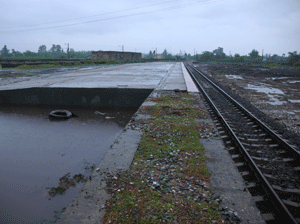 Ian Carver, Joni Simonishvili
Ian Carver, Joni Simonishvili
“Tank Station” is what locals are calling a large concrete platform that has recently been constructed along a line of freshly laid railroad tracks near the Georgian conflict zone of Abkhazia.
It has certainly been a “War of Words” in the run-up to contested parliamentary elections scheduled for May 21, 2008. Georgian TV is talking of provocations by Akhaz and Georgian forces on a daily basis – and how well-laid plans are being laid for a shooting war that will destabilize the fledgling democracy in this small pro-Western country. Especially worrying is how it was recently reported on Georgian Public TV and Rustavi2, how there had been a crackdown on the free moment of returned IDPs in the Gali region of the breakaway and frozen conflict zone of Abkhazia, and that a curfew had been imposed in the Gali region (which is mostly inhabited by ethnic Georgians).
Two foreign journalists went to check it out, making it into the Gali region by a footbridge and found the curfew story to have been fabricated – and just another page in the media PR move book of the government of president-elect Mikhail Saakashvili. However, that is not the meat of the story, as in the process they stumbled onto what was really going on in West Georgia, which further discounts which side of the conflict is the real war monger (one who urging or attempting to stir up a shooting war). However, in spite of making it to Gali and back without much fanfare, checking out Russian peacekeeper movements and border security, developments on the Georgian side of the de-factor Abkhaz border proved to be far more interesting and real “breaking news.”
Friday, May 9, 2008 5:20 AM – After getting off the night train at a small village in West Georgia, two foreign journalists, one being a former US army 19D Scout, trained in Amour and reconnaissance at Fort Knox Kentucky, and a Mengrilian IDP from Sukhumi, who has family living on both sides of the de-facto Georgian Abkhazian border, walked down the rail tracks in a light rain towards the border with Abkhazia. They did not find any soldiers on the Georgian side of the border, only a few block posts of Russian Peacekeepers. However, they discovered what they had only heard about and suspected of being in place: a newly constructed railway spur leading into a destroyed industrial area.
Earlier they had been provided a tip that large boulders and rocks had been placed along a newly laid railway spur for the purpose of unloading tanks in a rapid fashion. However, following an on-the-ground investigation, it became obvious that the alleged military preparations had taken a much more advanced and concrete form. The boulders had disappeared into a wide, 100 meter long sloped and reinforced platform shaped in a way to unload large vehicles simultaneously.
Talking to the locals, before crossing over into Gali, they learned that the work had not been completed with local labor but instead by professional expertise and imported labor, which had especially brought in from outside the region. They used modern equipment so as to achieve a higher than Georgian standard of quality. It was clear when inspecting the spur and what appeared to be a tank unloading dock, that the site selection took advanced planning; it was intentionally laid to run alongside an already existing portion of foundation, the edge of which had been reinforced with a freshly painted steel fascia.
It seems that Georgia is more active in planning for war than what some pundits are claiming while the media is preoccupied with Russian provocations, Georgian spin doctors play the shooting down of paper airplanes, and the comparison can be made to an endless supply of Number 5 campaign posters that get ripped up as quickly as they can be pasted back in a never-ending war of words. Is this about geopolitics, or is it all about stacking the Parliament with only members of the ruling National Party?
The EU and the US is backing Georgia in its stance that the decisions by Russia to increase the number of peacekeepers in the conflict zone and establish diplomatic ties are considered as provocative steps. Moreover, Georgian officials claim that unlike Russia, Georgia is not beefing up its military presence and that the recent moves by Russia are part of the annexation of the breakaway regions. The main justification by the Russians is that Georgia has established a large concentration of troops in the Georgian controlled territory of Kodori gorge and that it was necessary to increase the number of peacekeepers to prevent further bloodshed in the region.
Whatever the larger geopolitical games and their consequences may be, the decision to increase peacekeepers in Abkhazia may not be totally unjustified. The presence of on-going or near complete military infrastructure being professionally constructed in close proximity to the border demonstrates that Georgia is actually preparing for war against the Abkhaz.
Ian Carver, freelance photojournalist living in Tbilisi for two years



